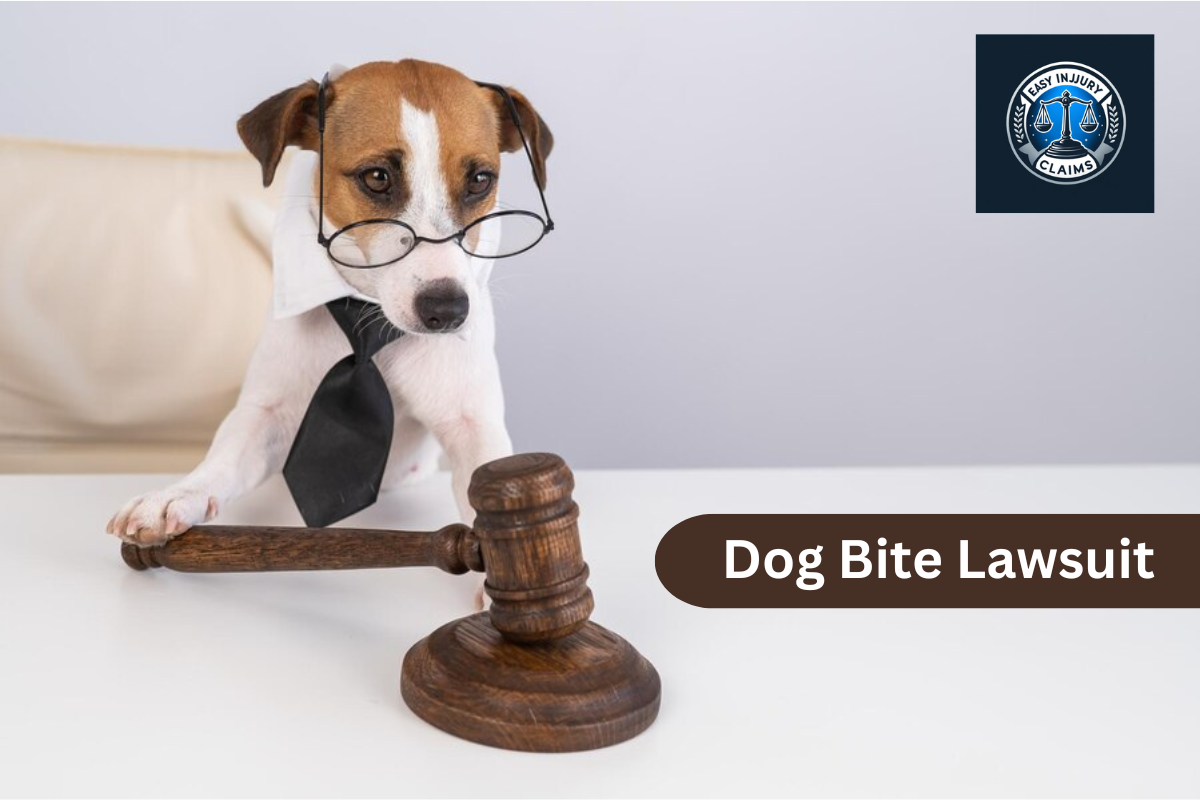Introduction to Dog Bite Lawsuits
Overview of dog bite cases
A dog bite lawsuit happens when someone gets hurt because of a dog bite and seeks legal help to get compensation. These cases usually involve injuries from bites, scratches, or other dog-related accidents. The person who got hurt files a dog bite lawsuit against the dog owner to claim damages for their injuries.
Importance of understanding legal rights and processes
It is crucial to know your rights and the legal process when dealing with a dog bite lawsuit. Knowing these helps you to act quickly and correctly after a bite. Understanding your rights can help you get the compensation you deserve. It also ensures you follow the right steps to build a strong case.
Legal Definition of a Dog Bite Incident
What constitutes a dog bite under the law
A dog bite under the law means any injury caused by a dog using its teeth to break the skin. This includes direct bites where the dog’s teeth penetrate the skin. In legal terms, it is crucial to show that the injury was caused by a dog’s bite to prove the case in a dog bite lawsuit.
Differentiating between a bite and other dog-related injuries
A dog bite is different from other injuries caused by dogs. For example, scratches, bruises, or injuries from being knocked over by a dog do not count as bites. These other injuries may not be covered in a dog bite lawsuit unless they result from aggressive behavior connected to the bite incident. Identifying the exact nature of the injury helps in determining if it falls under a dog bite lawsuit.
Common Causes of Dog Bites
Aggression and territorial behavior
Dogs often bite when they feel threatened or are protecting their territory. Aggressive behavior can be triggered by someone approaching their space, their owner, or their food. This kind of reaction is common in dog bites, especially when the dog sees the situation as a threat.
Lack of proper training or socialization
Dogs that have not been trained properly or have not been socialized well with other people and animals might be more likely to bite. Without proper training, a dog may not learn how to behave correctly around strangers or other animals, leading to unexpected bites.
Previous history of aggression
Dogs with a past history of aggressive behavior are more likely to bite again. If a dog has bitten someone before or shown signs of aggression in the past, it may bite in the future. This history can be important in a dog bite lawsuit to show that the dog had a pattern of aggressive behavior.
Who Can Be Held Liable in a Dog Bite Lawsuit?
Dog owner responsibilities
The dog owner is usually held responsible for a dog bite. Owners must control their dogs and ensure they do not cause harm to others. If a dog bites someone, the owner can be liable for injuries caused by their dog. This responsibility includes ensuring the dog is trained and not allowed to roam freely.
Liability of property owners
In some cases, the property owner where the bite happened can also be liable. If the property owner failed to provide a safe environment or did not control a dangerous dog on their property, they might share responsibility. For example, if a property owner allowed a known aggressive dog to be loose, they could be held accountable in a dog bite lawsuit.
Potential for other parties being held accountable
Other people or organizations can also be held responsible in a dog bite lawsuit. This includes dog walkers who might not control the dog properly or shelters that did not disclose a dog’s aggressive history. Each case is different, and liability depends on the specific circumstances and roles of each party involved.
Steps to Take After a Dog Bite Incident
Immediate medical treatment
Get immediate medical treatment for a dog bite. Even if the bite seems minor, it is important to see a doctor. Medical treatment can help prevent infections and ensure proper care for the wound. It also provides a record of the injury, which is important for a dog bite lawsuit.
Reporting the incident to authorities
Reporting the incident to authorities is a crucial step. Inform local animal control or the police about the bite. This helps to document the incident and may prevent future bites. The authorities can also investigate the dog’s history and assess whether the owner is following local laws.
Gathering evidence (photos, witness statements)
Gathering evidence is important for building a strong case. Take photos of the injuries and the scene where the bite occurred. Collect witness statements from anyone who saw the incident. This evidence supports your claims in a dog bite lawsuit and helps prove the extent of the injuries and the circumstances of the bite.
Proving Liability in a Dog Bite Lawsuit
Establishing negligence or fault
To win a dog bite lawsuit, you must show that the dog owner was negligent or at fault. This means proving that the owner did not take reasonable steps to control their dog or prevent the bite. For example, if the owner failed to secure the dog or ignored warning signs of aggression, they can be held liable.
Demonstrating the dog’s history of aggression
Showing that the dog had a history of aggression can help prove liability. If the dog had previously bitten someone or displayed aggressive behavior, it can support your case. Evidence of the dog’s past actions can show that the owner knew or should have known about the dog’s dangerous tendencies.
The role of local leash laws and regulations
Local leash laws and regulations can play a role in a dog bite lawsuit. These laws require dogs to be on a leash or otherwise controlled in public places. If the owner violated these laws and this led to the bite, it can help prove their liability. Demonstrating that the owner did not follow local regulations can strengthen your case.
Types of Damages You Can Claim
Medical expenses
In a dog bite lawsuit, you can claim medical expenses for the cost of treating your injuries. This includes hospital bills, doctor visits, medications, and any future medical care needed. These expenses can add up, so it is important to keep all receipts and records of your treatments.
Pain and suffering
Pain and suffering refers to the physical pain and emotional distress caused by the dog bite. This type of damage compensates for the discomfort, anxiety, and mental anguish resulting from the injury. It is often calculated based on the severity of the injury and its impact on your quality of life.
Lost wages
If you had to miss work due to the dog bite and your recovery, you can claim lost wages. This includes any income you missed while you were unable to work, as well as any future earnings you may lose if the injury affects your ability to work long-term.
Punitive damages
Punitive damages are meant to punish the dog owner if their actions were particularly reckless or intentional. These damages go beyond compensating for your losses and are designed to deter others from similar behavior. They are not always awarded but can be significant in cases where the owner’s conduct was extreme.
The Process of Filing a Dog Bite Lawsuit
Consulting with a personal injury attorney
Start by consulting with a personal injury attorney. An attorney can guide you through the legal process and help you understand your rights. They will review your case, advise you on the best course of action, and help you gather the necessary evidence. Choosing an attorney with experience in dog bite lawsuits increases your chances of a successful outcome.
Filing a complaint and initiating legal action
Once you have your attorney, the next step is filing a complaint and initiating legal action. The complaint is a legal document that outlines your claims against the dog owner and details the damages you are seeking. After filing the complaint with the court, the lawsuit is officially started, and the dog owner will be notified.
Discovery phase and gathering evidence
During the discovery phase, both sides gather and exchange evidence. This includes collecting documents, taking depositions, and obtaining witness statements. Gathering evidence is crucial to prove your case, so your attorney will help you collect all relevant information, including medical records, photos of injuries, and any evidence related to the dog’s behavior and the incident.
Settlement vs. Trial: What to Expect
The benefits and drawbacks of settling out of court
Settling out of court can be a faster and less expensive way to resolve a dog bite lawsuit. Benefits include avoiding the uncertainty and stress of a trial and receiving compensation more quickly. Settlements also save on legal fees and court costs. However, drawbacks include potentially receiving a lower amount than you might win at trial and giving up your right to a court decision. Settlements are often reached through negotiations between your attorney and the dog owner’s insurance company.
The trial process and what to anticipate
If you do not settle, your case will go to trial. The trial process involves presenting your case before a judge or jury. You and your attorney will present evidence, call witnesses, and make legal arguments. The dog owner will also have the opportunity to present their side. Anticipate that the trial process can be lengthy and stressful, and there is no guarantee of winning. The outcome depends on how well each side presents their case and the decision of the judge or jury.
Negotiating a fair settlement
Negotiating a fair settlement is key to resolving your case without going to trial. Your attorney will work to get the best possible offer from the dog owner’s insurance company. They will use evidence from your case to support your claims and negotiate for compensation that covers all your damages, including medical expenses, pain and suffering, and lost wages. A fair settlement takes into account the severity of your injuries and the impact on your life.
Tips for Winning a Dog Bite Lawsuit
Importance of detailed documentation
Detailed documentation is crucial for a successful dog bite lawsuit. Keep thorough records of your medical treatments, including bills and reports. Document the injuries with photos and keep a log of how the injuries affect your daily life. Gather witness statements and any evidence related to the incident. Detailed documentation supports your case and helps prove the extent of your damages.
Working with experienced legal professionals
Working with experienced legal professionals can greatly improve your chances of winning. An attorney who specializes in dog bite lawsuits understands the complexities of these cases. They will provide guidance on gathering evidence, filing paperwork, and negotiating with insurance companies. Their expertise in handling similar cases can help navigate the legal process and achieve a favorable outcome.
Understanding local laws and regulations
Understanding local laws and regulations is important in a dog bite lawsuit. Different areas have varying laws about dog ownership, leash requirements, and liability for dog bites. Knowing these laws helps you build a stronger case and ensures that you follow the correct procedures. Your attorney will help you understand how local regulations apply to your situation and how they can impact your case.
Preventing Dog Bite Incidents
Training and socialization for dogs
Proper training and socialization are key to preventing dog bite incidents. Training helps dogs learn how to behave around people and other animals. Socializing a dog from a young age helps them become accustomed to various situations and people. This reduces the likelihood of aggressive reactions and helps the dog interact safely with others.
Educating the public about dog safety
Educating the public about dog safety can also help prevent dog bites. Awareness campaigns and educational programs teach people how to approach dogs safely and recognize signs of aggression. This knowledge can help prevent incidents and encourage respectful interactions with dogs, reducing the risk of bites.
Measures to take as a responsible dog owner
As a responsible dog owner, you should take several measures to ensure safety. Keep your dog on a leash or in a secure area to prevent them from running loose. Ensure your dog is well-trained and supervise interactions with strangers and other animals. Address any signs of aggression promptly with the help of a professional trainer or behaviorist. Following these steps helps prevent dog bites and keeps both your dog and others safe.
Conclusion
In a dog bite lawsuit, it’s essential to understand the legal definition of a dog bite, common causes, and who can be held liable. Key steps include seeking immediate medical treatment, reporting the incident, and gathering evidence. Proving liability involves demonstrating negligence, showing the dog’s history of aggression, and understanding local laws. You can claim damages for medical expenses, pain and suffering, lost wages, and punitive damages. The process involves consulting an attorney, filing a complaint, and possibly going to trial. Settlements can be quicker but may offer less compensation than a trial outcome.
If you are involved in a dog bite incident, seek legal advice as soon as possible. An experienced attorney can guide you through the legal process, help you understand your rights, and work to get the compensation you deserve. They will ensure that all necessary steps are taken to build a strong case and assist you in navigating any challenges that may arise.
FAQs
Q. What should I do if a dog bites me?
If a dog bites you, seek immediate medical treatment to address the wound and prevent infection. Report the incident to local authorities and gather evidence such as photos of the injury and witness statements. Document your medical treatments and any impact on your daily life. Consult with a personal injury attorney to explore your legal options and understand your rights.
Q. How long do I have to file a dog bite lawsuit?
The time you have to file a dog bite lawsuit is determined by the statute of limitations in your area. This period usually ranges from one to three years from the date of the incident. It’s important to act quickly to ensure you meet the deadline. Consulting with an attorney can help you determine the exact timeframe and ensure that your case is filed on time.
Q. What if the dog owner doesn’t have insurance?
If the dog owner doesn’t have insurance, you may still have options for pursuing compensation. You can potentially file a claim directly against the dog owner’s personal assets. Additionally, if you have health insurance or other forms of coverage, they may help with medical costs. Consulting with an attorney can help you explore alternative methods for obtaining compensation.
Q. Can I sue for emotional distress in a dog bite case?
Yes, you can sue for emotional distress in a dog bite case. This includes compensation for the psychological impact and emotional suffering caused by the incident. The severity of emotional distress and its impact on your life will be considered. Your attorney can help you present evidence of how the bite has affected your mental well-being and seek appropriate damages.
Q. What are the common defenses used in dog bite lawsuits?
Common defenses in dog bite lawsuits may include claims that the victim provoked the dog or was trespassing on the dog owner’s property. The dog owner may argue that the dog was not aggressive and that the bite was an isolated incident. They might also claim that they were unaware of the dog’s aggressive tendencies. An experienced attorney can help you address these defenses and strengthen your case.
Dive into the world of Law with Easy Injury Claims. Visit our website to uncover endless inspiration!












Got a Questions?
Find us on Socials or Contact us and we’ll get back to you as soon as possible.